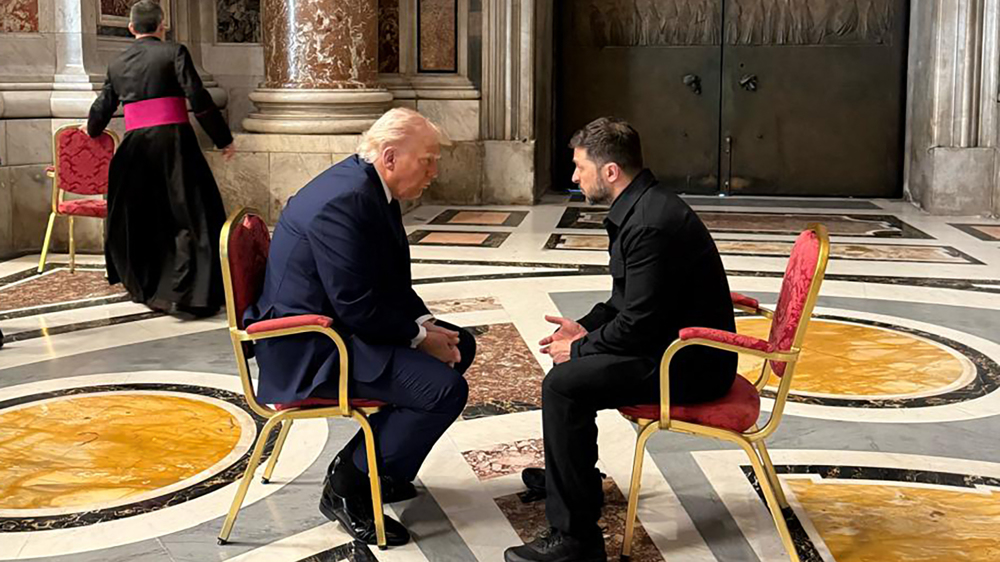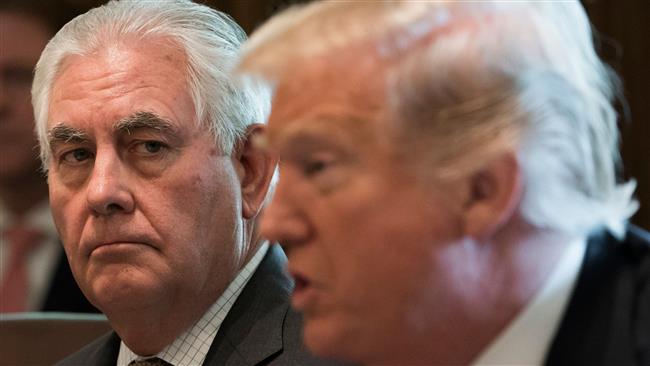White House in talks with Congress on a 'fix' to stay in Iran deal: Tillerson
US Secretary of State Rex Tillerson says the White House is actively working with congressional leaders to find a legislative "fix" to the Iran nuclear agreement so that the United States would remain in the multi-nation accord.
“The president said he is either going to fix it or cancel it,” Tillerson said in an interview with The Associated Press on Friday. “We are in the process of trying to deliver on the promise he made to fix it.”
The changes to the US law regulating the US participation in the 2015 deal could come as early as next week or shortly thereafter, the top diplomat said.
Tillerson's comments come as President Donald Trump must decide by January 12 whether he will re-certify the Iran deal, known as the Joint Comprehensive Plan of Action (JCPOA) reached between Iran and the P5+1 group of countries, including the United States.
Re-certification indicates that Iran is complying with the terms of the nuclear accord.
Trump faces a series of deadlines in the coming days about what to do with the Iran deal, which he has called an “embarrassment” to the US and “the worst deal ever negotiated.”
Trump has not made a decision about whether he will certify the pact next week and continue to waive sanctions against Iran.
Under the JCPOA, Iran undertook to put limits on its nuclear program in exchange for the removal of nuclear-related sanctions imposed against the Islamic Republic.
In October, Trump refused to certify Iran's compliance, and warned he might ultimately terminate the deal in defiance of other world powers. In doing so, the president passed the buck to Congress, which was given 60 days then to decide how to proceed with the deal.
Congress allowed a deadline on reimposing sanctions on Tehran to pass last month, leaving the deal intact and effectively punting the issue back to Trump again.
Tillerson said Friday Trump might be prepared to preserve the deal by waiving sanctions again if Congress acted quickly.
"I don't want to suggest we're across the finish line on anything yet," he said.
A congressional aide confirmed to AP that there has been progress in talks between congressional leaders and the White House, but added the discussions had not started on a specific text.
Republican Senator Bob Corker and Democratic Senator Ben Cardin, both members of the Senate Foreign Relations Committee, visited the White House on Thursday to discuss the issue with National Security Adviser H.R. McMaster, another aide said.
One option under discussion is the possibility of removing the requirement that the US president certify Iran’s compliance, something Trump loathes to do every three months. Another possibility, officials said, would be changing the law so that the certification would occur far less often.
The negotiations could only result in face-saving measures that would allow the Trump administration to stay in the nuclear deal, rather than imposing any new restrictions on Iran.
Early last month, EU foreign policy chief Federica Mogherini warned Tillerson of the adverse consequences of a possible move to step away from the nuclear deal.
"I have reaffirmed the European Union view that continued implementation of the Iran nuclear deal is a key strategic priority for European security but also for regional and global security," she said after a meeting with Tillerson in Brussels.
The International Atomic Energy Agency (IAEA) has repeatedly verified Iran’s adherence to the terms of the JCPOA since January 2016, when the deal took effect.

Trump’s tariffs spark fears of price hikes, product shortages in US: Report

Trump, Zelensky hold 'productive' talks ahead of Pope's funeral in Rome

Betar US: America's new face of Zionist terrorism and the darker rebirth of Kahanism
VIDEO | Press TV's news headlines
Iran more than halved its power grid losses to 10% in 16 years: Expert
Abbas names likely successor in move deemed ‘illegitimate, divisive’
Illegal Israeli settlers attack Palestinian school in occupied West Bank
VIDEO | Israeli forces tighten siege on Jenin refugee camp
Iran restores operations at its largest container port after explosion
Leader offers condolences over ‘painful’ port blast in southern Iran
VIDEO | Yemeni army attacks sensitive Israeli military sites with ballistic missiles









 This makes it easy to access the Press TV website
This makes it easy to access the Press TV website